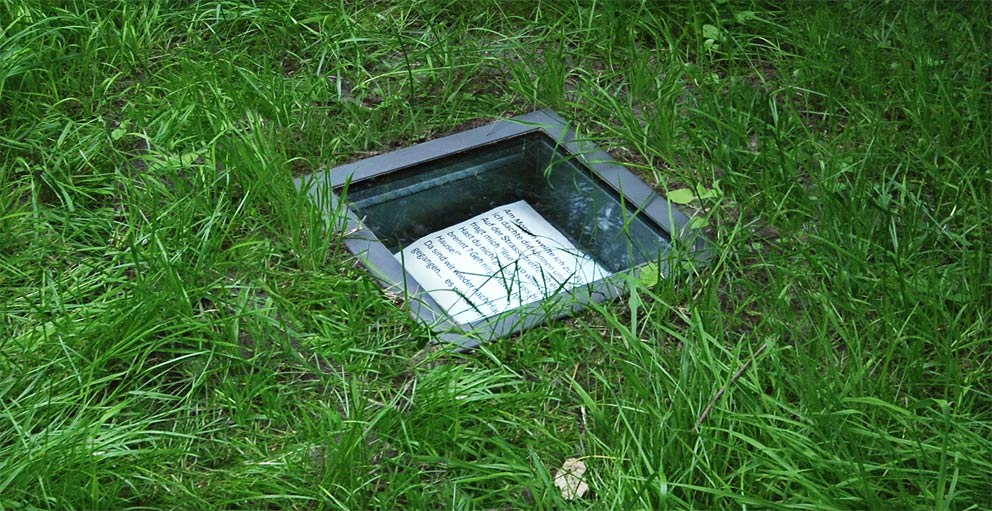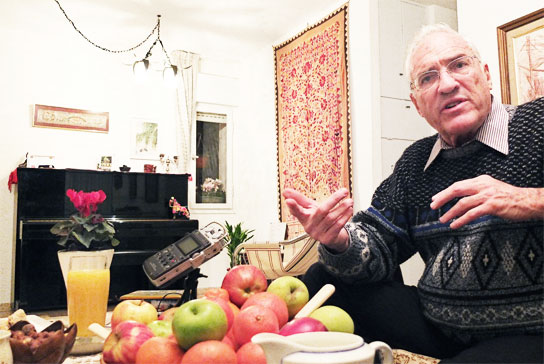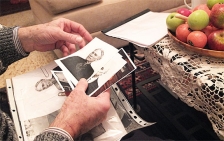


If I may suggest, if words are so important in your project, there is one word in Hebrew you should put in, and that’s the word: Shalom. Shalom!
You spell it in English: S-h-a-l-o-m.
Shalom is the most, the basic important Hebrew word. That means peace everywhere, peace for everybody. You have one word, you don’t have different kinds of peace. Because peace is peace. Like truth is truth.
My name is Zvi Gimmon. I’m a surgeon working in Jerusalem, Israel, in Hadassah Medical Center.
My connection to Marburg is a genetic connection. I’m connected to Marburg because my father was born there, my grandparents were born there. And at (in?) those days the name of the family was Goldschmidt. My grandparents owned a special business shop for shoes: Salamander shoe business in Steinweg Dreiundhalb in the middle of Marburg. And actually my father left Marburg at in 1934 after the Nazi regime came into power.
My father was a local patriot of Marburg. He used to tell me: “We, we in Marburg did have a Nobel laureate“. A Nobel laureate from Marburg was Paul Ehrlich. So he was very proud, my father, of being born in Marburg. And then within a year, 1933 till 1934, everything changed upside down. It’s like a complete social, political earthquake.
Because… I was astonished by the way of how my father understood at 1934 – he was then 25 years old –, how he understood that he has to leave everything and to run away to a country that he didn’t know, and to leave his parents behind, and not having anyone in Israel. So it is a major decision. In order to take such a major decision try to think now on everyone of yourself: Can you come … and within, let’s say, a few weeks decide that you cut all the connections that you have? And you emigrate to a different, completely different surrounding that you don’t know how it looks, and that in the days when you didn’t have television? You didn’t know how countries are looking like. You didn’t have telecommunication, you didn’t have iphone, you didn’t have telephone. So, to disconnect from everything.
And I asked him: “How did you come to the diagnosis that the disaster is coming at as early as 1934?“ A year after Hitler came into power. Because, when I asked him this question I thought about myself: Would I have succeeded to come to the diagnosis that something awful is going to come? And what brought you? How could you feel the atmosphere? What were your parameters, that things turned to be so bad.

“So how did you understand that you have to leave?” He said: “Because I saw the change of the behaviour of my colleagues from highschool.” When he graded it [graduated?] in 1927 he was in regular class and those who grew up with him were his friends. And he did have good social relation (relations?). And then when Hitler came into power the good friends, those who grew up with him, changed their attitude. And he saw them walking in the streets of Marburg and singing then – there was a song, I don’t know whether any one of those whom you talked with told you what the song was … there was a song that … my father obviously knew it in whole of it, but I remember one sentence said: “Wenn Judenblut von dem Messer spritzt …” [“When the blood of Jews will spatter from the knife…“] That was the main repetitive motive of the song. And when he saw that his friends are singing this song and they don’t say hello anymore, and they avoid entering his house, and that nobody came to the shop to buy shoes anymore, those who were good customers many years … and that happened in a very short time.
But if you ask me about what I gained for my father was that the behaviour of people who surround you can change. And they can change promptly, and they can change 180 degrees promptly. And then the next conclusion is … You should … but that is like a heritage that had to be told … But you should very carefully try to be strong enough and independent so that it will not happen.
Ruth Gimmon:
What we cannot understand is that … we … Now we ask more questions but we don’t have someone to answer us. Not me for my father not him for his father …
So the connection to Marburg is that we knew that the roots of the family of our father is from Marburg. He wanted to come back to Germany. He was very hesitant and it took many years after, you know this organization “Jüdische-Christliche Zusammenarbeit”, they invited them to come back for a visit. And then my father with my mother went to Marburg and later me and my brother, too. So we are the second generation and we were there.
The mayor of Marburg did a reception for us and donated to each of us a book of Marburg. And if you open the book of Marburg at the final pages, you see the history of Marburg … And what is very very peculiar is that nothing happened in Marburg from 1939 till 1945. Blank. Nothing. You can hear that that archbishop came and he … this and that and that – everything till 1939 – and then again from 1946. And in between nothing happened.
The main message that I would think that would be important for everyone who would look at the special memorial is that to beware of any dramatic change in attitude of people that may destruct the whole society. And if it happens, and sometimes it may happen not necessarily at the same place and in the same nations, but still people have to be aware that it may change the behavior dramatically, and not to take for granted that what was before will last forever. And there is always a huge danger of a change of human behavior that may cause disaster.
